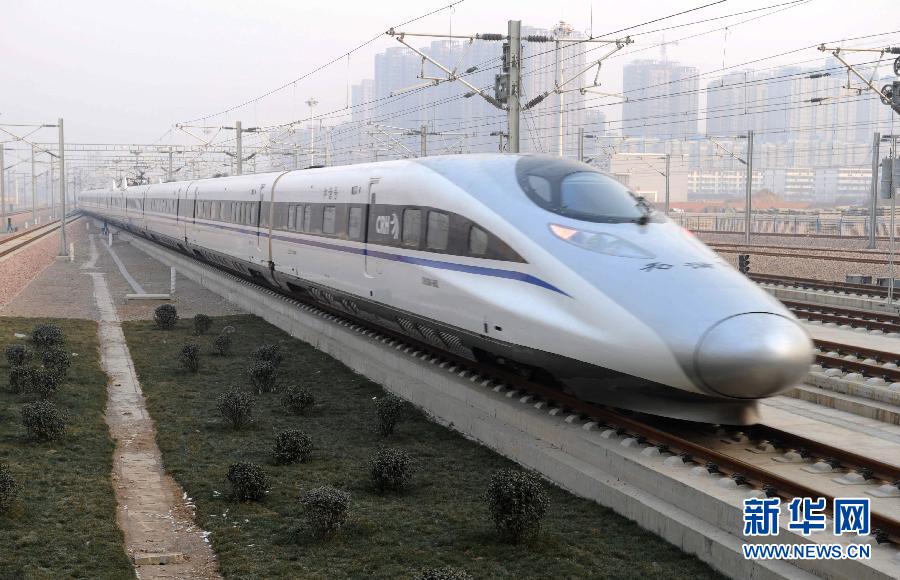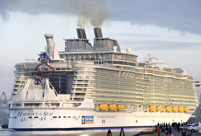


Ahead of an international exhibition, China's railway insiders returned to topic of whether to increase the top speed of bullet trains.H The proposals to increase the top speed on China's high-speed rail (HSR) network have emerged as China seeks to export its trains and HSR technology. (Source: Xinhua)
BEIJING, June 12 -- Ahead of an international exhibition, China's railway insiders returned to topic of whether to increase the top speed of bullet trains.H The proposals to increase the top speed on China's high-speed rail (HSR) network have emerged as China seeks to export its trains and HSR technology.
"Technology and safety controls allow bullet trains to run at a maximum speed of 350 km per hour," explained He Huawu, chief engineer with China Railway Corp. (CRC), the country's railway carrier and a major successor of the dismantled ministry of railways.
He made the remarks earlier this week at a news briefing for the 13th China International Modern Railway Technology & Equipment Exhibition scheduled from June 20 to 22.
In summer 2011, the ministry lowered the top speed of bullet trains to 300 km per hour over safety concerns.
The decision was made shortly after Sheng Guangzu, now CRC general manager, replaced disgraced chief Liu Zhijun to head the ministry.
A deadly train collision in July that year in east China's Zhejiang Province cast a shadow on the burgeoning industry, although the following investigation found no evidence to link speed to the incident
"In a strategic move, China should restore the designed speed of 350 km per hour to demonstrate that the rail technology is safe and reliable," said Zuo Dajia, associate professor at the Southwest Jiaotong University.
Although some countries seemed cautious about cooperation with Chinese enterprises, a number of overseas rail contracts have been inked, including a high-speed line between Russia's Moscow and Kazan.
"China's restoration to the designed speed will benefit the exports of high-speed trains and technology," Zuo added.
China currently operates more than 19,000 km of HSR track, accounting for more than 60 percent of the world's total. The network is quickly increasing as the country upgrades its transport infrastructure.
Policymakers must now carefully weigh up the profits and costs before deciding whether to increase the operation speed.
"The current limit is reasonable in terms of operational and maintenance costs," said the CRC chief engineer.
Higher speeds can translate into an increase in power consumption, noise, and wear and tear, according to Sun Zhang, a railway professor at Tongji University.
He gave an example: Nearly all the bearings had to be replaced after a bullet train completed a test in late 2010 with its peak speed reaching 486.1 km per hour.
"Speed increases will definitely lead to cost hikes. But it is difficult for outsiders to calculate as the whole system is so complex," said Hu Siji, a professor with Beijing Jiaotong University.
Higher speeds can also add more pressure on train drivers and other staff.
Despite all the drawbacks, Zuo said higher speed means less trains will be needed, thus, less expenditure for the CRC.
"I did not see any comparison between the increase in operational costs and the decrease in purchase expenditure," said Zuo.
The CRC chief engineer told media outlets that it could be a different story if higher speed brings in more passengers or leads to fare increases.
"A thorough study is needed to decide whether and when to increase the speed," he said.
 Five made-in-China hi-tech breakthroughs
Five made-in-China hi-tech breakthroughs Beijing Style: Hot pants
Beijing Style: Hot pants HK-Zhuhai-Macao Bridge to open to traffic
HK-Zhuhai-Macao Bridge to open to traffic China opens its first combined transport service to Nepal
China opens its first combined transport service to Nepal Students take stylish bikini graduations photos
Students take stylish bikini graduations photos Charming dancing students pose for graduation photos
Charming dancing students pose for graduation photos Guizhou, Yunnan section of Shanghai-Kunming railway connected
Guizhou, Yunnan section of Shanghai-Kunming railway connected Naked models transformed into landscapes, birds and even DRAGONS by body painting artist
Naked models transformed into landscapes, birds and even DRAGONS by body painting artist World’s biggest cruise ship Harmony of the Seas to start maiden voyage
World’s biggest cruise ship Harmony of the Seas to start maiden voyage Top 20 hottest women in the world in 2014
Top 20 hottest women in the world in 2014 Top 10 hardest languages to learn
Top 10 hardest languages to learn 10 Chinese female stars with most beautiful faces
10 Chinese female stars with most beautiful faces China’s Top 10 Unique Bridges, Highways and Roads
China’s Top 10 Unique Bridges, Highways and Roads US embassy car blamed for injuring woman
US embassy car blamed for injuring woman Why does Japan fear close Sino-Russian ties
Why does Japan fear close Sino-Russian ties ‘China refugee’ insult video slammed in Taiwan
‘China refugee’ insult video slammed in Taiwan A call to adjust affirmative action in China’s gaokao
A call to adjust affirmative action in China’s gaokaoDay|Week